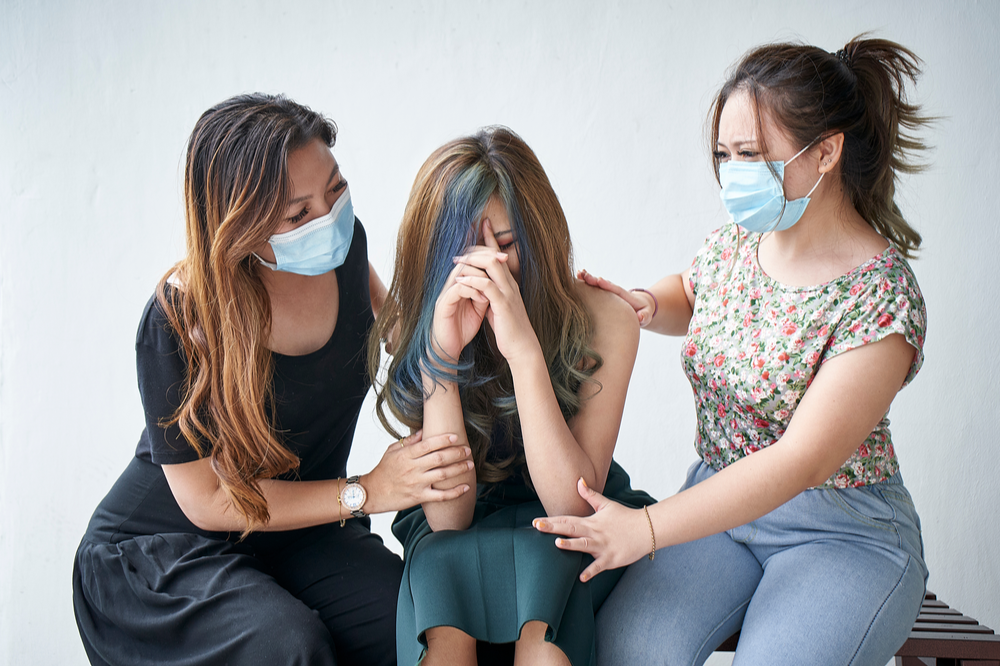How did COVID impact your life? As we’ve begun to explore the world again (or even the grocery store) without a mask, how is your mental health?
There’s a lot of talk right now about collective stress and collective trauma. It’s important, however, to understand the difference between trauma and stress before we diagnose the world’s population as experiencing post-traumatic stress disorder (PTSD).
Trauma
According to the American Psychological Association (APA), trauma is defined as:
An emotional response to a terrible event like an accident, rape, or natural disaster. Immediately after the event, shock and denial are typical. Longer-term reactions include unpredictable emotions, flashbacks, strained relationships and even physical symptoms like headaches or nausea. While these feelings are normal, some people have difficulty moving on with their lives. Psychologists can help these individuals find constructive ways of managing their emotions.
Trauma can also exist in a series of events. If a child is emotionally or physically abused and witnesses highly charged emotional states repeatedly, complex PTSD can result. For information about complex PTSD, read more at the U.S. Department of Veterans Affairs: PTSD: National Center for PTSD.
Stress
According to the National Institute of Mental Health (NIH), stress is defined as:
Stress is how the brain and body respond to any demand. Any type of challenge—such as performance at work or school, a significant life change, or a traumatic event—can be stressful. Stress can affect your health. It is important to pay attention to how you deal with minor and major stressors, so you know when to seek help.
Our Collective Stress
COVID left its collective mark on our collective psyche. What now?
This actually depends, somewhat, on which category you fit into pre-COVID.
Consider two different COVID experiences.
Jeff: When businesses began shutting down, Jeff found himself out of work and isolated at home at the beginning of COVID. As the manager of a restaurant that closed permanently, he had to think on his feet in order to make ends meet. The strain was enormous, but he found an outlet in exercise and video calls with friends and family. As someone in recovery with a substance use disorder, Jeff also adapted to online 12-step meetings. Luckily, he had a supportive family who was happy to help him temporarily. Once vaccinated, Jeff explored making a career change. He enrolled in culinary school, along with finding a part-time job. While COVID was stressful, Jeff’s life is actually in a better place post-COVID.
Alice: Alice is married to a man who doesn’t handle stress well. When things get stressful, Alice’s husband rages. Pre-COVID, her husband raged a couple of times each month. During COVID, everyone was locked inside a small apartment with tremendous financial pressure looming. Alice’s husband started raging once or twice each week. She and the children felt as if they were walking on eggshells constantly. Then, Alice’s mother passed away. The combination of constant tension in the house, grief over her mother, and financial strain left its mark on Alice. Now that things are opening up again, she feels exhausted. Going home after work is really difficult for her, after a year of terrible rages and emotional abuse. She finds herself avoiding her house. Sometimes, Alice will park her car at a nearby public garden and sit for hours.
In Jeff’s case, he already had a support system in place. While his life wasn’t perfect, he was honestly facing some challenging issues like a substance use disorder. When COVID appeared on the scene, Jeff adapted by adding some exercise, staying connected and asking for help from family. In the long run, the healthy lifestyle he started pre-COVID only improved post-COVID. The stress he experienced motivated him to make some positive professional changes.
For Alice, however, there were issues in her life requiring emergency attention. COVID only exaggerated those stresses. The combination of rages, parenting, no support at home, and grief over a death put Alice in something of an emotional chokehold. Her efforts to avoid home are typical of someone experiencing PTSD. She is avoiding her husband and her home because her body is trying to protect her from any more extreme emotional situations.
Take Inventory of Your Life
Take an inventory of your life pre-COVID and today. What issues did you have before COVID? Did anything become amplified during COVID? Did COVID create an unsustainable home situation, where you lived in a constant state of tension?
Look at your own mental health. Are you depressed? Do you feel hopeless? Are you having suicidal thoughts?
Do not suffer in silence. The Ranch Pennsylvania is here to help. With our expert staff of compassionate mental health professionals, you can enjoy your life again no matter how low you feel today. Call us today and ask your questions. We are here to guide you in the best direction for your best mental health. Call The Ranch Pennsylvania at 717.969.9126.

